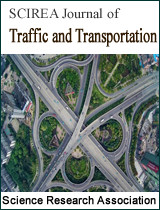A real case application for traffic demand estimation using multi-class vehicle traffic counts
DOI: 315 Downloads 141851 Views
Author(s)
Abstract
All the elements of a transportation system model generally suffer from some approximation. Normally the traffic demand estimation is considered the most crucial and problematic element to be simulated, and vehicle traffic counts are generally used to “update” it so that the whole model system is able to reproduce the observed road vehicle flows. Updating demand estimation using traffic counts has received considerable attention in recent years. In this paper a methodology for updating the demand vector using traffic counts on congested networks was applied to the real case of the mobility demand estimation of the Naples city (Italy). The results of the estimations show the good capacity of the proposed methodology to reproduce the vehicle traffic counts observed. Furthermore, through the estimated traffic demand was possible to analysed the structural characteristics of the traffic demand within Naples city.
Keywords
transportation planning; origin-destination demand updating; bi-level programming problem; transportation simulation model.
Cite this paper
Armando Cartenì,
A real case application for traffic demand estimation using multi-class vehicle traffic counts
, SCIREA Journal of Traffic and Transportation.
Volume 2, Issue 1, February 2017 | PP. 1-14.
References
| [ 1 ] | Bell, M., The estimation of origin-destination matrices by constrained generalized least squares. Transp. Research vol.25B(2), pp.13-22, 1991. |
| [ 2 ] | Ben Akiva, M.E., Macke, P.P., Hsu, P.S., Alternative methods to estimate route-level trip tables and expand on-board surveys. TRB1037, 1-11, 1985. |
| [ 3 ] | Brenninger-Göthe, M., Jornsten, K. O., Lundgren, J. T, Estimation of origin/destination matrices from traffic counts using multiobjective programming formulation. Transportation Res. 23B 257–269, 1989. |
| [ 4 ] | Bell, M.G.H., Lam, W.H.K., Iida, Y., A time-dependent multiclass path flow estimator. Proc. 13th Symposium on Transportation and Traffic Theory. Lyon, France, 1996. |
| [ 5 ] | Cartenì, A. and Punzo, V., Travel time cost function for urban roads: a case study in Italy. WIT Transactions on the Built Environment, 96, pp. 233-243, 2007. |
| [ 6 ] | Cascetta, E., Estimation of trip matrices from link traffic counts and survey data: a generalized least square estimation. Trans. Research vol. 18B, 1984. |
| [ 7 ] | Cascetta, E., Transportation systems engineering: theory and methods. Kluwer Academic Publishers, 2001. |
| [ 8 ] | Cascetta, E., Nguyen, S., A unified framework for estimating or updating Origin-Destination matrices from traffic counts. Transportation Research, vol. 22B, pp. 437-455, 1988. |
| [ 9 ] | Cascetta, E., Papola, A. and Cartenì, A., Prediction reliability of the transport simulation models: a before and after study in Naples. Proceedings of the European Transport Conference (ETC), Strasbourg, France, 2005. |
| [ 10 ] | Cascetta, E., Postorino, M.N., Fixed point models for the estimation of O-D matrices using traffic counts on congested networks. Transportation Science, Vol. 35, 2001. |
| [ 11 ] | Chen, Y., Florian, M., O/D demand adjustment problem with congestion. Part I: model analysis and optimality conditions. CRT Publication No. 94-56, Centre de Recherche sur les Transport, Univ. de Montreal, Canada, 1994. |
| [ 12 ] | de Luca, S. and Papola, A., The evaluation of Travel demand management policies in the urban area of Naples. 8th “Urban Transport and the Environment” Proceedings, Lemnos, Greece, WIT Press, pp.185-194, 2001. |
| [ 13 ] | Di Gangi, M., Una valutazione delle prestazioni statistiche degli estimatori della matrice O/D che combinano i risultati di indagini e/o modelli con i conteggi di flusso di traffico. Ricerca Operativa No. 51, pp. 23-59, 1988. |
| [ 14 ] | Doherty, A.R., A comprehensive junction delay formula, LTR 1Working Paper, Department of Transport, 1977. |
| [ 15 ] | Fisk, C. S., On combining maximum entropy trip matrix estimation with user optimal assignment. Transportation Res. 22B 69–73, 1988. |
| [ 16 ] | Fisk, C. S. and Boyce, D. E., A note on trip matrix estimation from link traffic counts data. Transportation Res. 17B 245–250, 1983. |
| [ 17 ] | Maher, M.J., Inference on trip matrices from observations on link volumes. A Bayesian statistical approach. Transp. Research vol.17B(2),435-447, 1983. |
| [ 18 ] | McNeil, S., Quadratic matrix entry estimation methods. Ph.D. thesis, Dept. of Civil Engineering, Carnegie-Mellon University, Pittsburgh, PA, 1983. |
| [ 19 ] | Nguyen, S., Estimation on O/D matrix from network data: A network equilibrium approach. Publication 87, Centre de Recherche sur les Transport, Université de Montreal, Canada, 1977. |
| [ 20 ] | Nguyen, S., Modèle de distribution spatiale tenant compte des itineraire. INFOR21(4), 1983. |
| [ 21 ] | Spiess, H., A gradient approach for the O/D matrix adjustment problem. Publication No. 693, CRT Université de Montréal, Montréal, Canada, 1990. |
| [ 22 ] | Van Zuylen, J.H., Willumsen, L.G., The most likely trip matrix estimated from traffic counts. Transportation Research vol. 14B, 1980. |
| [ 23 ] | Willumsen, L.G., Estimating time-dependent trip matrices from traffic counts. Proceeding of 9th International Symposium on Transportation and Traffic Theory, VNU Science Press, Utrecht, 1984. |
| [ 24 ] | Yang, H., Heuristic algorithms for the bi-level origin/destination matrix estimation problem. Transportation Research 29B 2, 1995. |

